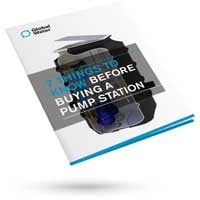What is a Basement Pump System
Effective stormwater management is vital in homes with basements to prevent flooding and structural damage. A basement sump pump handles internal water, while a DrainAce stormwater pump station manages external runoff. Together, they safeguard homes from flooding and ensure reliable water management inside and out.

What is a Basement Pump Station?
A basement pump station, or sump pump system, is designed to remove water that accumulates in lower levels of a home, especially in basements below the natural drainage level. It addresses water ingress from heavy rainfall, high water tables, or nearby water sources.
Water is collected in the pump station chamber, and as the water level rises, the pump inside activates, removing the water and directing it outside—often into a stormwater management system, such as a stormwater pump station.
By connecting to an external stormwater pump station, a basement pump for the house ensures that collected water is managed efficiently beyond the home, protecting the property from potential internal flooding.
How External Stormwater Pump Stations Support Basement Pump Systems
External stormwater pump stations are typically installed in areas where large volumes of water accumulate due to rainfall. In residential areas, these pump stations are essential for moving stormwater away from houses and other structures, especially in low-lying or flood-prone areas. Residential stormwater pump stations collect water from rain, roof runoff, and nearby areas, pumping it out to a designated drainage area, such as a waterway or municipal drainage system.
When running in unison, a basement pump station and stormwater pump station effectively manage both internal and external water flow. This combined approach ensures that water from within the home is efficiently managed, reducing the risk of overflow or localised flooding.
How Basement and Stormwater Pump Stations Work Together
Having both systems in place creates an effective approach to stormwater management for properties with basements:
- Internal water removal: As water accumulates in a basement, it flows into the basement pump station which is then transferred to higher ground through a discharge pipe.
- Connection to stormwater system: The discharge pipe connects to the property’s stormwater drains, linking the basement pump system to the larger stormwater pump station network for a coordinated water management solution.
- Managing external water: As the stormwater pump station collects runoff from roofs, driveways, and surrounding areas, it pumps out water to a safe drainage area. This prevents water build-up around the property’s foundation and directs it away from the home.
By working together, basement and stormwater pump stations provide a multi-layered approach to stormwater management. This is especially useful during heavy rainfall, when both the basement pump station and the stormwater pump station might be operating at full capacity to manage internal and external water runoff.
Types of Basement Pump Systems for Stormwater Management
Different types of basement pump systems are available, each offering specific advantages based on the needs of the home and its stormwater requirements:
- Single pump systems: These are ideal for houses with minimal water accumulation. They handle moderate inflows and work well in areas with lower rainfall, where the stormwater system can manage external flows.
- Dual pump systems: For areas with frequent heavy rainfall, dual pump systems provide extra safety ensuring a back-up pump should one fail.
- Battery backup systems: In homes where power outages are common during storms, a battery backup system ensures that the basement pump stations continue to operate even if the main power supply is disrupted. This adds another layer of security to your stormwater management.
Maintaining Your Basement Pump System and Stormwater Runoff System
Regular maintenance is important to keeping both your basement pumping station and stormwater pump system function effectively. Key maintenance steps include:
- Checking for debris: Before winter or your rainy season, check the pump station and pump for any debris.
- Testing the pump: Run a quick test on the pump to make sure it activates when needed. This includes checking the float switch and verifying the discharge pipe is free from blockages.
- Inspecting stormwater drains: Clear any debris from stormwater drains around the property to ensure there is no obstruction.
- Battery backup testing: If your system includes a battery backup system, test it periodically to confirm it’s ready in case of a power outage.
Integrating an internal basement pump station with an external stormwater pump station offers comprehensive stormwater management, protecting homes from water damage, preserving structural integrity, and ensuring a safe, dry environment. For more information, get in touch with the Global Water team, or explore our stormwater pump range.




